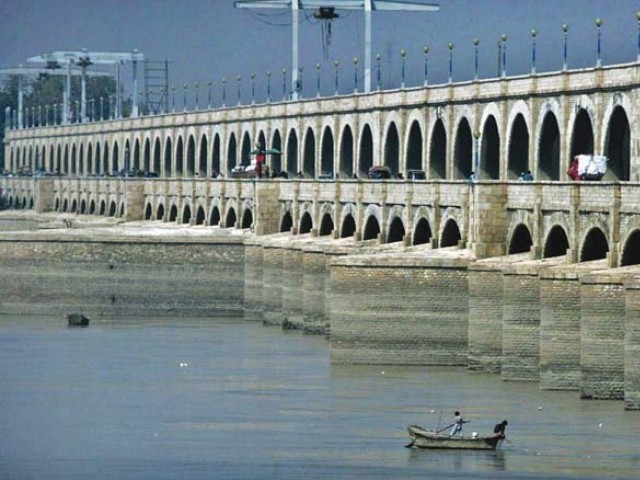
The Irsa team has visited different barrages, including Chasma, Taunsa, Guddu, Sukkur, Kotri and Garang Regulator, which supplies water to Balochistan.
Upon contact, the authority's operations director Rana Khalid confirmed the team's visits to different barrages, saying, "We want to get an accurate measurement of water discharge at all the barrages." The visits are being conducted to give a presentation to the World Bank's review team, which is expected to arrive in Pakistan in the last week of September, he informed.
"Our sole purpose is to stop water from going to waste and therefore we want to properly calibrate each and every cusec of water discharge," he added.
Expected shortage
On Thursday, the pond level of Tarbela Dam was 1,538 feet and its inflow was 107,000 cusecs, while outflow was 145,000 cusecs, said Sukkur Barrage control room in-charge Abdul Aziz Soomro. However, if no rainfall occurs in the catchment areas and the situation continues, then Tarbela's pond level might go down to 1,525 feet.
"No water shortage will be experienced during the initial stage of Rabi season, but if no rainfall occurs in March next year, there might be a water shortage," he said.
During the team's visit to Sukkur Barrage, it was informed that the barrage needs at least 200,000 cusecs of water to maintain its pond level and provide water to its seven off-taking canals according to the indent.
Ineffective system
On Wednesday, the Irsa team visited the Sukkur Barrage and took measurements of water discharge in upstream and downstream through the decades-old traditional method, said an official.
Reliance on traditional methods stems from the failure of the telemetry system which was installed at all the barrages.
In 2003, the Water and Power Development Authority (Wapda) installed a telemetry system to monitor water discharge. The system, built at an estimated cost of Rs350 million, aimed to calibrate water discharge in the upstream and downstream to put an end to the debate on water distribution.
After its installation, the telemetry system was run on trial basis, but it proved to be ineffective due to which the irrigation authorities refused to take it over.
Then, Irsa took the system over but soon it was handed back to Wapda and was not functioning properly. Since then, the system is being run by the Wapda. An official working at the telemetry system, requesting anonymity, also claimed that the system does not work properly.
Speaking about the telemetry system, Soomro said it has not been working since the first day. Officials posted at the system get the discharge calibration from us and then forward it to Irsa, he added.
Water controversy
For decades, the measurement of water discharge at different barrages of the country has remained controversial. While Sindh blames Punjab for not providing water according to the indent, Balochistan accuses Sindh for the same.
Irsa is responsible for looking after the just distribution of water among the provinces, but so far it has failed to meet the expectations.
"We had promised the provinces that they will get water according to the indent for Kharif season and we fulfilled it," said Khalid. As far as the water indent for the Rabi season is concerned, a meeting of Irsa's advisory committee will be held on September 20 to decide the water share of the provinces keeping in view the shortage.
Soomro also said that during the Kharif season, water to all the canals was provided according to the indent.
Published in The Express Tribune, September 9th, 2016.

1732437695-0/drake-and-charles-(1)1732437695-0-165x106.webp)


1732434981-0/BeFunky-collage-(10)1732434981-0-165x106.webp)












COMMENTS
Comments are moderated and generally will be posted if they are on-topic and not abusive.
For more information, please see our Comments FAQ